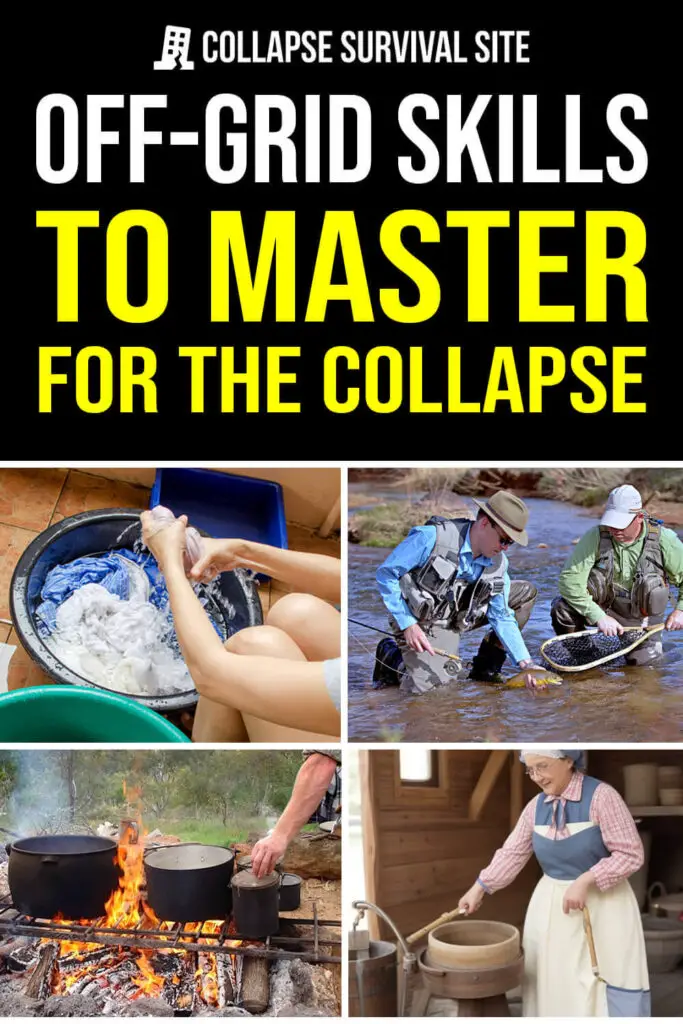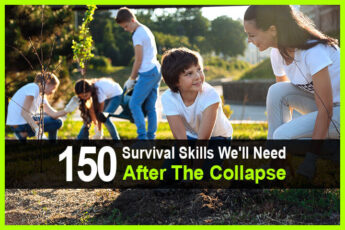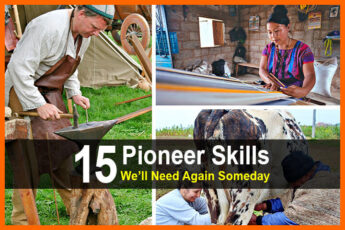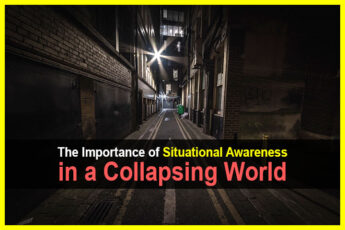Estimated reading time: 29 minutes
Historically, any level of societal collapse has an immediate effect on goods and services within a country and even across continents. Things that people would take for granted are in short supply or simply unavailable.
As time goes on and the collapse continues access to many of life’s basic necessities becomes a daily challenge. It’s in this environment that the ability to enable self-sufficient actions and skills can make all the difference in the health and well-being of an individual, their family and their community.
The big question is to what degree can you enable self-sufficiency in an environment short of resources? The best answer is to engage the skills you need to survive and maintain a stable and healthy lifestyle. The more knowledge and skills you possess, the better your odds for enduring the challenges of highly uncertain times.
Want to save this post for later? Click Here to Pin It On Pinterest!
We’re going to review many of the basic skills that can get you and your family through various scenarios that a societal collapse could bring about. It’s unrealistic to think that most people could master all of these skills, but we’ll conclude with the value of forming and embracing a community to share skills, knowledge and goodwill to get through the worst of it.
To a large degree, various links to books, articles, videos and basic tools and materials will be featured. The idea is to understand the importance of many of these skills, and to at least acquire some of the knowledge you need to create, build, repair and restore the necessities of everyday life.
Some of these skills are modern ideas that have emerged. Others are inspired by the self-sufficiency of our pioneer ancestors, and a few are long-forgotten technologies embraced by ancient civilizations. All of them will have a place in a time when more and more of us may find ourselves on our own.
Fundamental Survival Skills
These are skills focused on the basic necessities of life. They represent the fundamental priorities we need to survive ranging from food and water to first aid.
Books:
- Street Survival Skills
- Living Off the Land
- Bushcraft Skills
- When Crisis Hits Suburbia
- Basic Survival
- U.S. Armed Forces Nuclear, Biological And Chemical Survival Manual
Articles:
- 20 Primitive Skills We Should All Start Learning
- 11 Emergency Skills to Learn While There’s Still Time
- 25 Basic Skills To Master Before The SHTF
- 9 Survival Skills You Can Learn At Home (or in Your Backyard)
- 11 Urban Survival Skills That Could Save Your Life
- 5 Survival Skills My Grandpa Taught Me
Videos:
- 13 Skills You NEED to Survive the Coming Collapse
- 20 Wilderness Survival Tips and Bushcraft Skills
- 30 Specific Skills to Survive a Long Term Apocalyptic Scenario or Grid Down
Supplies:
Water
If for any reason the water is not running -finding and purifying water will become an immediate priority. Knowing where to look and how to collect, purify and store water is a skill some people have never stopped to think about.
Many may be thinking about it quickly given that we can’t survive 3 days without it. In actual fact, 5 civilizations collapsed in the first place because of a shortage of water.
Books:
Articles:
- How to Find Water in a Survival Situation
- Where Did The Pioneers Get Their Drinking Water?
- 5 Off-Grid Water Sources and Systems
Videos:
Supplies:
Finding Water
Knowing where to look for water in and around your location is a necessary skill in addition to the ability to assess water quality. Rivers, lakes and ponds are the obvious choice but springs and creeks may or may not be better alternatives. Rainwater is always a possibility and don’t forget, there’s 40 to 50 gallons of water in that water heater in the basement for emergencies.
Books:
Articles:
- How to find water in the city after a collapse
- 7 Bushcraft Skills You Must Have To Survive In The Wild
- 4 Ways to Collect Water Off Grid
- Emergency Water Sources That Are Already In Your Home
Videos:
Supplies:
Purifying Water
Even rainwater requires some level of filtering and purification, mostly due to the collection of dust, dirt, debris and bird droppings that accumulate on a roof which is a common collection source for rain. Knowing how to construct a filter and how to purify water with improvised materials is skill that transcends water purification tablets that will eventually run out.
Books:
Articles:
- 15 Ways To Purify Water In A Survival Scenario
- 16 Ways to Purify Water Off The Grid
- 8 Survival Water Mistakes That Could Make You Sick (Or Worse)
- 8 Fastest Ways to Purify Water
Videos:
Supplies:
Water Storage
It makes sense to store water but there are limits. You need a lot of water in storage to last any length of time and water is heavy at 7.5 pounds per gallon. Water also has a shelf-life so knowing what to do to preserve and store water and all of the things involved with water storage is an easy but important skill to know.
Books:
Articles:
Videos:
Supplies:
- 30 Gallon Portable Water Storage Tank
- 5-Gallon Water Storage Stack (40 Gallons total)
- 160 Gallon Water Storage Tank
- Water Treatment for Long-term Storage
Wells
Most of us wouldn’t think to dig a well on our property –at least until we’ve gone a few months struggling to find and collect water. Success with any dug well depends a lot on geography and your location, but knowing how to find the best spot to dig a well, and what’s involved with actually digging it is a skill that can not only help you but friends and family members as well.
Books:
Articles:
Videos:
Supplies:
Food
Food seems to emerge as a priority in most of the survival information out there, but stockpiling is a short-term solution if you become totally dependent on food-storage for nutrition. Skills associated with food go beyond storage to gardening variations, food preservation, and cooking approaches in a possible off-grid environment.
Books:
Articles:
- Wild Plants People Ate During The Great Depression
- 7 Stores Where You Can Get a Great Deal on Survival Food
Videos:
- EMERGENCY Prepper Pantry – One Year Supply of FOOD
- DO NOT STOCKPILE FOOD! (This Way) 5 Most Common PREPPER PANTRY Food Storage MISTAKES
Supplies:
Gardening
Sustainability is key to many aspects of survival and self-sufficiency through gardening is one of the most sustainable activities. How to turn your yard and even buckets into a high yielding garden can go a long way towards providing you with food security.
Books:
Articles:
- A Strategic Plan for Long-Term Gardening
- How to Grow an Indoor Survival Garden Year Round
- 12 Easiest Crops for Survival Gardeners
- The Beginner’s Guide to Survival Balcony Gardening
- 25 Pioneer Skills That Will Make You Self-Sufficient
- The Complete Guide to Garden Tools
Videos:
- Planting the Vegetable Garden
- How To Build A 5 Gallon Bucket Garden
- Growing Food Indoors – The Ultimate Guide
- How to Grow a CONTAINER Garden, CHEAP and EASY Patio Gardening
Supplies:
Cooking
Many of us are accomplished barbecue chefs for the occasional weekend cookout. But how many of us can cook outdoors for 3 meals a day, 7 days a week?
At a time without gas or electric power, having the ability to cook a variety of meals from soups to stews to baking and roasting over an open-fire will be a necessary skill. It may be worth taking the time to learn about all of the ways to do it.
Books:
Articles:
- The Ultimate Guide To Cooking Without Power
- 15 Manuals and Cookbooks Every Homesteader Should Own
- 25 Strange Meals People Ate During The Great Depression
- How to Choose The Perfect Stove for Off-Grid Cooking
- 13 Tools You Need for Campfire Cooking
Videos:
- Cast Iron Cooking in the Off Grid Forest Kitchen
- Off Grid Cooking Methods YOU CAN TAKE ANYWHERE
- Become a Dutch Oven Master! |The Ultimate Beginner's Guide to Dutch Oven Cooking
- Making Maple Syrup From Start To Finish
Supplies:
Food Preservation
Whether you grow your own vegetables, raise livestock, hunt, fish, or forage –knowing how to preserve the foods you hunt and gather is a critical skill. This is especially true in a time that is potentially without the conveniences of refrigeration or freezing.
Books:
- The Prepper’s Canning and Preserving Bible
- Home Food Preservation
- The Complete Guide to Food Preservation
- The Ultimate Dehydrator Cookbook
Articles:
- 6 Rules for Safe Canning to Learn Before You Get Started
- 11 Reasons To Start Canning Meat
- 101 Easy Canning Recipes For Beginners
- Canning vs Dehydrating: Which Method is Better?
- Fermentation 101: How to Make Yogurt, Sauerkraut, and More
Videos:
- How To Can Food | Home Canning For Beginners
- Canning Meat (Super Easy Raw Pack)
- The Ultimate Food Dehydrator Guide
- I cooked every MEAT in a SMOKER, it blew my mind!
- Curing Meat With Salt | Preserving Meat With Salt At Home
- The Complete Guide to Fermenting Every Single Vegetable
Supplies:
Medical Skills and First Aid
A nightmare scenario is when hospitals are overrun and doctors and dentists are simply unavailable. Having a range of medical skills that go beyond Bandaids and sunburn are literally vital.
Books:
- The Survival Medicine Handbook
- The Ultimate Survival Medicine Guide
- Nuclear War Survival Skills
- U.S. Army First Aid Manual
- Where There is No Doctor
- Where There is No Dentist
Articles:
- 13 Medical Skills Every Prepper Should Learn
- 10 First Aid Skills For When Hospitals Are Overcrowded
- 9 Most Important First Aid Skills To Learn
- 7 First Aid Skills To Learn Before Going Off Grid
- How To Build An Emergency Dental Kit
Videos:
- Basic First Aid
- First Aid for Choking
- Resuscitation CPR
- Burn First Aid
- First Aid for Poisoning
- Snake Bite First Aid
Supplies:
Natural Remedies
Pharmaceuticals run on a delicate supply chain and even over-the-counter medications will be in short supply after a societal collapse. Knowing herbal and natural remedies that are proven and clinically validated will be one of the most important skills in a collapsed society.
Books:
Articles:
- 15 Survival Plants That Are Both Edible AND Medicinal
- 22 Natural Medicines You Can Make at Home
- How Our Ancestors Stayed Healthy Without Modern Medicine
- 14 Natural Alternatives to Antibiotics
Videos:
- 10 Natural Remedies That Actually Work
- 6 Home Remedies That are Proven by Science
- 6 Popular MEDICINAL HERBAL REMEDIES
- 5 Amish NATURAL Remedies for Common Ailments
- Discover the Top Medicinal Herbs to Grow
Supplies:
Heating
Without the grid, most people don’t have heat. Having the knowledge and skills to design, build and improvise heating solutions is something some of us don’t spend enough time thinking about. Having the skills to improvise and implement alternative heating solutions for a variety of applications is another critical skill set.
Books:
- U.S. Army Basic Cold Weather Manual
- The Compost-Powered Water Heater
- The Woodburner’s Companion
- Woodstoves: How to Make and Use Them
Articles:
- How To Keep Your Home Warm When Living Off Grid
- 4 Things You Can Burn for Heat Besides Firewood
- 3 Safest Ways to Heat Your Home in an Emergency
- DIY Space Heater That Really Works (No Electricity)
- 3 DIY Emergency Heaters
Videos:
- Off-Grid HEATING: Woodstoves and Fireless Alternatives
- ENDLESS Heat for Your Home WITHOUT Electricity
- Top 3 Off-Grid Heating Methods
- Passive EarthTube Heating & Cooling
- How to Use a Wood Burning Stove
Supplies:
Cooling
The recent heat waves we keep reading about may become a regular occurrence. Air-conditioning is the go-to solution, but what do you do when the power is out? There are ancient solutions and some new ways to stay cool and hydrated when the heat is at its worst.
Books:
- Off-Grid Living: Learn To Cool Down And Stay Comfortable Without Air Conditioner
- Off Grid Home Building
Articles:
- How To Stay Cool Without Electricity
- How People Kept Houses Cool Before AC Was Invented
- 10 Ways People Kept Cool Before Air Conditioning Existed
- How to Keep Livestock Cool in the Summer
- 10 Ways to Stay Cool When You Don’t Have an Air Conditioner
Videos:
- How to STAY COOL Living OFF GRID in the Desert
- Off grid Underground Air Conditioning
- EARTH AIR TUNNEL || HOW IT WORKS || passive cooling technique
- Geothermal cooling experiment
- Everything You Need To Know About Root Cellaring – Preservation 101
Supplies:
Self Defense
If you look at collapsed societies today from Haiti to Somalia you’ll see the need for varying levels of self defense preparations. And it’s not about just collecting a lot of guns. Here are some of the key skills to keep in mind when all things become unpredictable.
Books:
Articles:
- 5 Best Guns For Home Defense
- 5 Non-Lethal Weapons for Self Defense
- 5 Best Beginner Self Defense Guns for Women
- Weapons of Opportunity: How to Use Everyday Objects for Self Defense
- 8 Best Self-Defense Weapons During a Societal Breakdown
- 30 Ways To Improve Home Security Right Now
Videos:
- 2 Self-Defense Techniques that Could Save Your Life…
- What weapons and calibers are best for home defense?
- How to Prepare for a Home Invasion – Home Defense Tips
- 25 Basic self-defense techniques martial arts instructions
Supplies:
Off-Grid Skills
If one thing consistently shows up in collapsed societies from the recent past it’s that the local power grids are both unreliable and often down.
And it’s not just the power grid but Internet, communications, water and most everything else that relies on electricity to varying degrees to be functional. This is when pioneer and even ancient skills that emerged at a time without power become critical knowledge for survival.
Books:
Articles:
- 22 Basic Skills You’ll Have To Learn After The Collapse
- 30 Survival Skills Modern People Have Forgotten
- 15 Rare Skills That Will Come In Handy When SHTF
- 10 Lost Skills We Can Learn From The Amish
- 9 Street Survival Skills for the Concrete Jungle
- 30 Lost Survival Skills That Used to Be Common Knowledge
Videos:
- Homesteading Skills! Top 11 Essential Skills You Must Know That May Save Your Life!
- Fishing Videos: Survival Skills, Catch A Lot Of Fish, Bushcraft Survival, OFF GRID LIVING
- 12 Survival Skills Everyone Should Know!
- Learn 10 Advanced Bushcraft & Survival Skills!
Harvesting the Power of Water
Anyone living near a spring, creek or river has the ability to harness water power to accomplish a variety of tasks from generating electricity to powering machinery and tools. You just have to have the skills to make it happen.
Books:
- Water Power: Energy from Rivers, Waves, and Tides
- Principles of Construction and Efficiency of Water-wheels
Articles:
Videos:
Supplies:
Harvesting the Power of the Wind
Windmills and wind power are nothing new. Farms have used windmills for centuries to pump water and the Dutch are still famous for their windmills to grind grain into flour and power everything else on their farms.
There are contemporary solutions that can be used and understanding how to erect them and harness the power of the wind is an old skill worth revisiting.
Books:
Articles:
- Homemade Wind Turbine Car Alternator
- DIY Wind Generator
- 17 Brilliant DIY Wind Turbine Design Ideas For Living Off The Grid
Videos:
- Installing an American Icon. (how to install a windmill)
- Installing a wind turbine at home | how much power will it make?
Supplies:
Harvesting the Power of the Sun
Cultures have been using the sun to dry fruits, vegetables and wild game for centuries. The ancient Egyptians used polished, parabolic sheets of bronze to reflect the sun into darkened spaces.
And today, we have solar panels that harness the sun’s energy to create electricity. Knowing all the ways to use the sun is an ancient skill and if you don’t have those solar panels on hand –you can actually make a solar panel from old CD’s.
Books:
- The Off Grid Solar Power Bible
- DIY Solar Power
- Solar Power for Beginners
- Carpentry: For Pros by Pros
Articles:
- 10 Tips for DIY Solar Panels
- The Prepper’s Guide to Solar Generators
- How To Get Your Home Off The Grid And Onto Solar Power
- How to Build a DIY Solar Furnace
- 9 Ways To Harness Solar Energy
- The Ultimate Guide To DIY Off Grid Solar Power
Videos:
- DIY Off Grid (Whole House) Solar System
- Do It Yourself Solar Power? – Easy DIY Solar Panel Installation!
- How to Install a Solar-Powered Water Heater
- Best Solar Generator for 2023
Supplies:
- Whole House Solar Power Kit
- Solar + Wind Power Kit
- Whole House Solar Generator
- Jackery Portable Solar Generator Kit
- Solar Panels
Harvesting the Power of Gravity
You don’t come across a lot of information about the power of gravity but ancient cultures were masters of using gravity to their advantage. Understanding how you can use the weight of objects and liquids to your advantage with levers, fulcrums and pulleys is a lost skill worth remembering.
Books:
- Lost Technologies of Ancient Egypt
- Technology of the Gods: The Incredible Sciences of the Ancients
- Ancient Chinese Encyclopedia of Technology
- Greek and Roman Technology
Articles:
Videos:
- Moving Objects with Simple Machines
- Ancient Free Energy Device Re-created? Original Bhaskara's Wheel
- The best idea for a gravity generator
- Man Lifts 20 Ton Block By Hand?
- How were the pyramids of Egypt really built
Supplies:
Hand Tool Mastery
In a grid down scenario extension cords will be a thing of the past. So will all of the tools that were powered by electricity. Having the skill and ability to use hand tools for all of the things that we use to do with power tools will be the only option for a range of projects.
Books:
Articles:
- 21 Hand-Powered Tools You Need to Live Off the Grid
- How To Restore Vintage Tools
- 50 Homestead Tools for Off Grid Living
Videos:
Supplies:
Blacksmithing
Another lost art worth remembering. A simple anvil and a homemade forge will give you the ability to forge and shape metal with the use of some basic tools. It’s a great skill to master as a source of skill-barter, or because there are some things that duct tape and zip-ties just can’t fix.
Books:
Articles:
Videos:
- The 7 Basic skills of a Blacksmith
- Tools every Blacksmith NEEDS from Junk Yard Steel
- Blacksmithing – Building a simple DIY forge
- Start forging TODAY in your own backyard – no special tools required
Supplies:
Animal Husbandry
In addition to gardening, raising animals for food is a critical and sustainable practice and skill. It can be as simple as chickens and rabbits or as ambitious as pigs and cows. Horses are the go-to source of power on any Amish farm; you could even consider fish-farming and raising other fowl like ducks, turkeys and geese.
Books:
Articles:
- 25 Amish Skills We Should All Learn
- How to Start Raising Rabbits for Meat
- 10 Most Important Homesteading Skills
- 10 Common Livestock Mistakes to Avoid
- Top 10 Pig Breeds for Homesteaders
- The Homesteader’s Guide to Raising Chickens
Videos:
- BEST AND WORST Livestock for Beginners
- Everything you need to know about RABBIT RAISING
- Raising Backyard Chickens // Beginners Guide
- The Ultimate Guide to Raising Pigs on a Homestead
Supplies:
Basic Trade Skills
The ability to build, re-build, repair and restore anything will be a constant challenge and in constant demand. These skills are excellent barter skills and will most likely be needed on a regular basis.
Books:
- A Complete Guide to Traditional Skills
- The Forgotten Skills of Self-Sufficiency Used by the Mormon Pioneers
- Ultimate Guide: Barns, Sheds and Outbuildings
Articles:
Videos:
- 10 Essential Self Reliance Skills ~ Preparedness
- 11 Steps to Self Sufficiency
- Self-Sufficiency Tips from the Great Depression
Carpentry
While it’s true that lumberyards may be a thing of the past, there will be no shortage of scrap wood, pallets and even timber to some degree. The carpentry skills and ability to work with wood will be one of the most valuable skills you can master.
Books:
Articles:
- Top 10 Basic Carpentry Skills Every Newbie Should Master
- How to Frame a Structure Using Energy-Saving Techniques
- Nominal vs. Actual Lumber Dimensions
- How to Build a Vertical Garden
Videos:
- How to be a carpenter. Tips and tricks and stuff to know.
- Carpentry 101: Basics of Wood Framing
- The Most Useful Carpentry Trick I Ever Learned
Supplies:
Timber Frame Construction
The Amish are known for their timber frame construction skills, and at a time when even basic things like hardware may be in short supply it makes sense to understand this brilliant concept.
It involves learning the ways to chisel, shape and fashion wood to make joints that don’t require traditional hardware to hold together. In a time of widespread collapse it may become one of the most viable approaches to new construction.
Books:
- Timber Frame Construction: All About Post and Beam
- Learn to Timber Frame
- Hand Hewn: The Traditions, Tools, and Enduring Beauty of Timber Framing
Articles:
- Timber Framing 101: What is a Timber Frame House?
- Earthquake Damage Reduction in Timber Frame Houses
- 21st-Century Timber Framing
Videos:
- What is Timber Frame Construction? | The Complete Guide
- TIMBER FRAMED WORKSHOP Part 1 | Complete Project – LOGS to FRAME
- Timber Frame vs Conventional Stick Frame
Supplies:
Lumbering and Timber
If you have trees on your property or access to wild trees you have a valuable source of timber for building and firewood. That assumes you have the skills to safely fell a tree and know how to cut, saw and shape it into the lumber you need.
Books:
Articles:
Videos:
- WORLD'S BEST TREE FELLING TUTORIAL!
- Mastering the Key Notch Technique: Advanced Tree Felling Tutorial
- Why Heavily Back Leaning Trees Are EASY To Fell
- How Trees Fall With Different Undercuts
Supplies:
- Lumber Crosscut Saw
- Woodcutter’s Axe
- Log Splitting Wedge
- Froe (shingle splitter)
- Tree Felling Wedges
Roofing
Roofs are the most susceptible to all manner of natural disasters from wind to hail to falling trees and simple wear and tear. The skills to fix a roof are fairly straight-forward but failing to make any repairs or new installations improperly done can have disastrous consequences. Knowing how to do roofing right can avoid adding another problem to what may be a long list of disasters.
Books:
Articles:
- A Full Guide to DIY Roof Installation
- 10 STEPS TO BUILDING A ROOF
- Read This Before You Redo Your Roof
Videos:
Supplies:
Masonry
Basic masonry is another fairly simple skill, but there are more than a few mistakes that can make all of your efforts a fail. This is another skill that can be bartered from walling a well to new foundations for structures and a growing demand for fireplaces.
Books:
Articles:
- The Basics of Masonry
- 7 DIY MASONRY PROJECTS YOU MIGHT WANT TO TRY FOR YOURSELF
- How To Build a Brick Wall: A Step by Step Guide
Videos:
- DIY Stone work For Absolute Beginners, Diy Tips
- Bricklaying 101: How To Build A Brick Wall
- How To Lay Block Walls
- How To Finish Concrete (4 Basic Skills For Beginners)
Supplies:
Plumbing
Old plumbing never dies, it just starts to leak a lot. Whether you’re improvising a plumbing solution for your new rain barrels or confronted with a leaking pipe in the basement, there’s a good chance a good plumber will be hard to find.
Take some time to master at least some of the basic plumbing skills. And while you’re at it, assemble some of the critical tools.
Books:
Articles:
Videos:
- DIY Plumbing Basics: Watch this before doing any plumbing in your home!
- Plumbing Tips & Hacks That Work Extremely Well
- How To Fix ANY Pipe Leak! 2 BEST Ways For DIY Plumbing!
Supplies:
Electrical
Whether you’re installing solar panels for the first time or trying to connect a generator to power your house, understanding the skills surrounding electricity and electrical connections is something you may eventually encounter. This is especially true in a time of inconsistent electricity when brown-outs and black outs cause power surges when the electricity occasionally comes back on.
Books:
Articles:
Videos:
- Electrical Wiring Basics
- How To Install Rough In Electricity In A New Construction House – Beginners Guide To Electrical
Supplies:
Automotive repair
If you look at photos of streets from countries in the midst of economic or societal collapse you’ll no doubt notice something about the cars on the street. They all tend to be older and very, very used. In an economy where few can afford the grand luxury of a new car the only alternative is to keep those old cars running. This is a skill well worth learning regardless of the situation.
Books:
Articles:
- 6 DIY Automotive Repairs Anyone Can Do
- 105 Easy DIY Car Repairs You Don’t Need to Go To The Shop For
- Interested in DIY Auto Repair? Here's Everything You'll Need to Get Started
Videos:
- Car Repair For Beginners (Top 5 DIY Tips)
- DO YOUR OWN CAR MAINTENANCE: A HOW TO
- How to Patch/Plug Hole in Tire in LESS THAN 5 Minutes – Fix a Flat Tire – EASY FIX
Supplies:
Small Engine Repair
Here’s the short list: chain saws, lawn mowers, tractors, leaf blowers, trimmers, go carts, motorcycles, mini-bikes, compressors, generators, and more.
It’s always going to be a challenge to find gas, but if gas is on hand it sure helps to have a chain saw working or a generator running. In a time when most things have to be done by hand it makes sense to have the skills to keep those rare and precious small engines running.
Books:
Articles:
Videos:
- How to Diagnose and Repair a Small Engine
- How to Start a Reluctant Small Engine (What Repair Shops Don’t Want You To Know!)
- An introduction to small engine repair
Supplies:
Craft Skills
This goes beyond hobbies to what could better be described as life skills. This is the ability to make many of the domestic things we need for everyday life.
Some of these skills are very traditional like sewing and quilting, others a little more complex like pottery and leather crafting. At a time when everything is hard to buy it makes a lot of sense to have the skills to make or fix it yourself.
Books:
Articles:
- 17 Rare Skills That Will Be In High Demand After The Collapse
- 20 Survival Skills Most People Don’t Have Anymore
- 42 Homesteading Skills for Self-Sufficiency
- 15 Old-Fashioned Skills Your Great-Grandmother Had
- 13 Self-Reliance Skills The Pioneers Needed to Survive
- 100 Things You Should Stop Buying and Start Making
Videos:
Supplies:
Sewing
Everyone should know this basic skill and it’s important to remember that much of it will be done by hand. The supplies are inexpensive so make sure you have plenty stocked up for the day when you will most definitely need them.
Books:
Articles:
- A complete guide to sewing for beginners
- How to Hand Sew Basic Stitches
- Hand Sewing Stitches For Making Clothes By Hand
Videos:
- After watching this video, you will not throw away the leftover fabric / Sewing tips and tricks
- 12 Great Sewing Tips
- how to ACTUALLY start sewing your own clothes
Supplies:
Knitting, Crochet and Quilting
Another skill using simple tools and materials with some basics that are easy to learn. Take the time to understand the basic stitches, even if it’s just to knit a foraging bag from some old cordage.
Books:
- Firefly's Step-by-Step Encyclopedia of Needlecraft: Patchwork, Embroidery, Quilting, Sewing, Knitting, Crochet
Articles:
Videos:
- HOW TO CROCHET FOR ABSOLUTE BEGINNERS | EPISODE ONE
- Knitting for Beginners
- BEGINNER Scrappy 3D CUBE Quilt Tutorial
Supplies:
Pottery
You don’t need a potter’s wheel, but it helps. If you live in an area with any clay in the ground the skills of a potter will allow you to make and fire a variety of utensils from bowls to plates, cups and pitchers. It’ll be good to know how to improvise if you break a plate and can’t replace it from long blocks of closed stores.
Books:
- Beginner’s Guide to Pottery and Ceramics
- The Urban Potter: A modern guide to the ancient art of hand-building bowls, plates, pots and more
- Mastering the Potter’s Wheel
Articles:
Videos:
- Throwing and Turning a Pottery Bowl with Cross-sections
- How to Center Clay
- How I Hand Build a Pottery Bowl – No wheel required
Supplies:
Woodworking
It’s not about decorations, it’s about shaping wood to make axe handles, fix drawers and shutters, craft utensils, fix windows and doors and anyhing else that requires precise cutting and crafting of wood. When no one else is around to do it, it’s all up to you.
Books:
Articles:
- Woodworking 101: A Beginners Guide to Getting Started
- Woodworking for Beginners: Everything First-Timers Need To Know
Videos:
Supplies:
Leather Crafting
Another lost art that is surprisingly simple and allows you to upcycle old pieces of leather into new items from belts to bags to axe and knife sheaths and anything else you need with the flexibility and durability of leather.
Books:
Articles:
Videos:
- How to Start Leather Crafting
- Getting Started in Leathercraft – 10 Basic Tools Every Beginner Leather Craftsman Should Have
Supplies:
Upcycling in General
In a time of widespread improvisation, upcycling skills give you the ability to make anything out of anything. This is a hybrid of skills that’s defined more as a mindset and the ability to see the potential of lost or discarded objects.
It’s all about having the ability to see the potential for anything and knowing how to reinvent it to make what you need.
Books:
Articles:
- 10 DIYers on upcycling and DIY as a sustainable lifestyle
- The Art of Dumpster Diving
- 9 Survival Tools You Can Make From Tree Bark
Videos:
- 15 Clever Ways to Upcycle Everything Around You!!
- Genius Recycling Hacks & Clever Ways to Upcycle Everything Around You
Supplies:
Social Skills
Many of us already possess a good set of social skills. But we may need some new ones or enhance some of the skills we already have in a time of collapse.
From a stress standpoint it’s going to be a very tense time and interactions with other people will require a combination of caution and sensitivity. There will also be some unique situations that we may have little or no experience with.
Books:
Articles:
Videos:
Negotiating
To a larger degree, every conversation with others can fall into the category of a negotiation. There may be little time nor patience for small talk and when people don’t have much there’s a good chance they’ll be looking for something. Take the time to rethink your basic negotiation skills.
Books:
Articles:
Videos:
Bartering
Barter economies emerge rapidly in collapsed societies. Knowing how to assemble items for barter and once again, negotiating for a trade will be a valuable skill in a barter marketplace.
Books:
Articles:
- Bartering 101: What to do When Money Has No Meaning
- 25 Best Barter Items for a Post-Collapse World
- 15 Important Skills You Can Trade After SHTF
- 20 Best Black Market Trading Items
- 20 Skills You Can Trade After The End Of The World
Videos:
- Top 10 Rules of Bartering
- Top 5 Bartering Items – BE PREPARED for What’s Coming!
- SHTF Portable Bartering Kit
Languages
It’s tough to learn a new language but it can be done. You might also want to learn some common phrases and expressions if there are people in your area who don’t speak your language. Times of societal collapse have seen epic migrations and if you find yourself surrounded by people you don’t understand you’ll be at a disadvantage.
Books:
Articles:
Videos/Apps:
- How to LEARN ANY LANGUAGE on Your Own (Fast!)
- How to learn any language easily
- APP: Google Translate
Building a Community
We saved the most important skill for last. It goes beyond safety in numbers. A strong community is built on sharing and compassion. Part of that sharing and compassion is offering a unique skill either in trade or as a generous gesture to help someone overwhelmed by a task.
Just as important is assessing the skills of people in your community. It’s unreasonable to believe that someone could master all of the skills we’ve identified, but across a community there’s a good possibility that many of those skills will be represented by the collective group.
Take the time to build a community or join one. Make sure there is some level of identification of skill sets across the community so people know where to turn for help with a situation or challenge. In the end, the community you inhabit –whether it be extended family, friends, a neighborhood or a village will be the ultimate factor in your survival after the collapse.
Books:
Articles:
- How to Build a Survival Community Before The Collapse
- Where to Find Other Preppers and Survivalists
- How To Build A Disaster Survival Team
Videos:
Supplies:
Yes, There’s More
Without doubt we probably missed some skills that would be important in a collapsed society. From beekeeping to candle making to surgery, there are numerous skills and capabilities that will be needed when events are so unpredictable.
The skills you’ll need will also be dependent on your location and situation. If you can think of any skills we missed pursue them, or better yet identify them in the comments section below.
Like this post? Don't Forget to Pin It On Pinterest!









